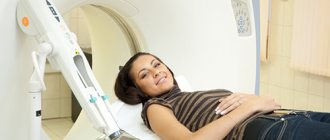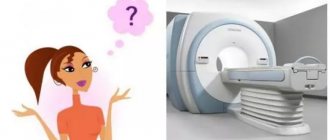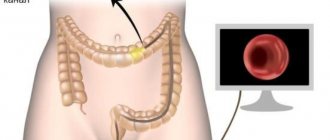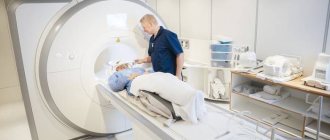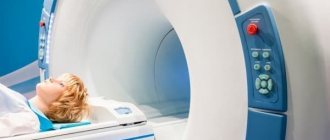A diagnostic method such as magnetic resonance imaging is prescribed equally often to men and women. This research method is considered to be the most accurate, non-invasive, and safe. But, if a woman is breastfeeding, she needs to know whether it is safe to do an MRI while breastfeeding, and whether the examination will have a negative impact on the baby through the milk being absorbed? Familiarization with the operating principle of the tomograph will help dispel any doubts.
How does a tomograph work?
Magnetic resonance imaging is a highly accurate diagnostic method that provides doctors with an accurate visual image of all systems:
- brain;
- soft tissues;
- blood vessels;
- bones;
- nerve fibers.
Magnetic resonance examination of any organ or system is carried out due to the influence of electromagnetic waves inside the constant magnetic field created by the apparatus. This technique eliminates the use of X-rays harmful to body tissues. Doctors prescribe this procedure even for infants.
Thanks to the combination of high-frequency pulses, a strong magnetic field and a modern computer system, doctors visualize the studied body structures down to the smallest detail.
Modern equipment allows:
- examine the state of the brain;
- study the spine;
- examine joint pathology;
- determine the temperature of internal organs;
- set the blood flow speed;
- study the features of cerebrospinal fluid transportation.
MRI - principle of operation
MRI is a modern in-depth diagnostic method that is based on the use of electromagnetic waves. There is no X-ray radiation involved, which allows the device to be used even for the smallest patients without causing harm to the body. At the same time, this is one of the most accurate ways to determine the presence of pathology and the severity of its development: the device will show in detail any part of the body, transmitting the result in various planes.
Magnetic resonance imaging is safe, even when a woman is caring for an infant. It does not provoke changes in the mammary glands or changes in the composition of milk.
Is examination allowed during lactation?
Sometimes MRI is prescribed for women who are breastfeeding. In some situations, an examination is vital. Can mother's milk harm a baby after undergoing magnetic resonance imaging? Doctors have different opinions on this topic. Some consider MRI a completely harmless procedure, after which a woman can feed her baby almost immediately. Others advise stopping breastfeeding for a certain period of time - about a day.
Having studied a lot of literature regarding the safety of MRI during such a delicate period as lactation, we can say unequivocally that:
- this diagnostic method does not affect the structure and quality of breast milk;
- If there is concern about the quality of the milk, the mother can express the milk after diagnosis and discard it. The baby can be fed the milk that was expressed before the examination.
The quality of mother's milk does not change after the procedure, this has been proven repeatedly. The problem is how the body of a nursing woman will react to a strong magnetic field. There is no consensus regarding the reaction of mammary gland cells to exposure to magnetic waves.
Some doctors emphasize that the effect of MRI on breast cells can increase the likelihood of developing cancer; they advise women not to undergo diagnostics in this way for 3 months after the end of lactation.
At the same time, many women still had to undergo an MRI while breastfeeding their baby; they claim that the procedure did not cause any harm to them and their children. After the MRI they feel great. The decision always remains with the patient and his attending physician.

Tomography during breastfeeding
During lactation, specialists can prescribe an MRI examination for women in the following cases:
- the need for preventive monitoring of the condition of breast implants;
- suspected pathology of the pituitary gland;
- diseases of the eyes, inner ear of unknown etiology;
- signs of a neoplasm in the mammary gland on a mammogram;
- spine pathologies;
- suspicion of an oncological process, tumor metastasis;
- monitoring the results of therapy;
- vascular diseases, etc.
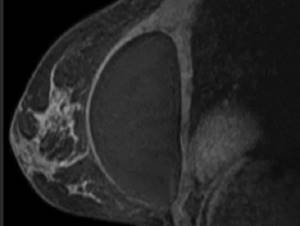
MRI image of the breast with an implant
Magnetic resonance imaging scanning has contraindications for use. To determine whether a woman can have an MRI while breastfeeding, the doctor analyzes the patient’s data. An absolute ban on the procedure is the presence of implants or other elements made of ferromagnetic metals:
- joint prostheses, middle ear;
- infusion port system for supplying medications;
- surgical devices (staples, pins, plates, etc.).
MRI during breastfeeding and outside the lactation period is not performed on patients with pacemakers. The field induced by the device can affect the operation of the device until it stops, which poses a threat to the woman’s life.
Relative contraindications are:
- pregnancy in the first trimester (if ovulation occurs, breastfeeding does not exclude conception);
- claustrophobia, weight more than 150 kg (restrictions apply to diagnostic tests using tunnel-type tomographs);
- physical and mental conditions that prevent you from remaining still during the scan;
- the presence of tattoos with metal particles - particularly sensitive patients may feel a slight burning sensation during the procedure.
Before tomography, subjects, including nursing mothers, must inform the doctor about existing or suspected contraindications.
The MR scanning procedure follows a standard algorithm:
- paperwork at the reception;
- changing clothes (if the nursing mother’s wardrobe items do not contain metal elements, they do not need to be removed);
- storage of personal belongings;
- instruction, placing the apparatus on the table, fixing the limbs to prevent accidental movements;
- cross-sectional imaging of organs in the area of interest;
- completion of the procedure or, if an in-depth study is required, injection of a contrast agent into the vein and repeated scanning.
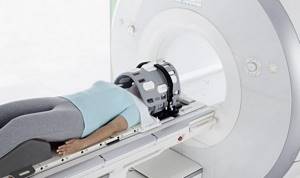
Positioning the patient on the conveyor of the head MRI machine
The operation of the tomographic apparatus is accompanied by quite loud sounds. Headphones are provided to muffle noise. If a woman undergoing an MRI while breastfeeding feels unwell, an alert button can be used. The procedure will be stopped immediately. If you have increased anxiety, you should consult with your doctor in advance about prescribing a sedative that is harmless to the baby, who is fed on mother’s milk. The woman can return to her usual activities immediately after the MRI.
Indications for examination of a nursing mother
When does a specialist prescribe magnetic resonance imaging for women during lactation? If the doctor needs to accurately visualize the internal organs to assess the patient’s condition and select the appropriate course of therapy, he can refer the woman to an MRI.
The procedure allows you to detect the following deviations from the norm in nursing mothers:
- nervous system disorders;
- bone marrow pathology;
- eye diseases;
- brain aneurysm;
- damage to the inner ear;
- encephalitis;
- injury to the tendon-ligamentous apparatus;
- pituitary diseases;
- multiple sclerosis;
- pathology of the paranasal sinuses;
- gastrointestinal diseases;
- meningitis;
- tumor;
- degenerative changes in the musculoskeletal system;
- diseases of the genitourinary system;
- cyst;
- mastitis;
- spine pathology;
- arthritis, arthrosis;
- mammary cancer;
- pathology of cerebral vessels.
MRI for lactation at the Elena Malysheva Diagnostic Center
Looking for where to get an MRI? To ensure that the examination takes place in a comfortable environment at the highest level, give preference to a trusted clinic.
Elena Malysheva's diagnostic center has highly qualified doctors with many years of experience, an expert-class tomograph and the most comfortable atmosphere for a nursing mother!
Sign up for an MRI at the Elena Malysheva Diagnostic Center near the Baumanskaya metro station (see map) by phone or leave a request on the website.
Baumanskaya metro station (see map) 8
leave a request on the website
Absolute contraindications to the procedure
In addition to conditional contraindications to examination using a magnetic field, there are also absolute ones. Diagnostics for breastfeeding women is allowed, but first you need to study all the contraindications for the study:
- the presence of iron implants (they can distort the results of the study);
- insulin pump;
- installed pacemaker;
- renal failure;
- allergy to the contrast agent in the mother or child.
MRI with contrast: to do it or not?
In some cases, for a more detailed examination and to study tumors in the body, it is necessary to conduct diagnostics using contrast. To do this, a substance is introduced into the body of the subject: barium sulfate, a drug containing iodine or gadolinium ions. They will help determine how dangerous the identified lesion is - benign or malignant.
Most often, a nursing mother faces problems in the functioning of the mammary glands. To determine what kind of disease needs to be dealt with and how dangerous it is, an MRI with contrast is prescribed. But this is the question that most often worries young parents: is it possible to do an MRI examination for a nursing mother with contrast, and will the substance harm the baby?
MRI does not provoke changes in the mammary glands or changes in the composition of milk.
To conduct an MRI examination for hepatitis B, women are usually given a drug containing gadolinium salts for general diagnostics or barium sulfate for the gastrointestinal tract. During this period, they try to exclude iodine-containing drugs. Barium is not dangerous for the baby, since it is not absorbed by the body and does not enter the milk, and will not be passed on to the baby.
Gadolinium is eliminated from the body quite quickly, and only about 0.05% of its particles can be ingested when feeding a child - this is a very small dose that will not harm him. In addition, in some cases, examinations are carried out on newborns, it is necessary to apply contrast, and its dose is several times higher than that received with mother's milk, but no undesirable changes are observed in children. There may be a possible risk due to individual intolerance; for this reason, before the procedure, a reaction test to the reagent must be tested.
If the mother still has doubts about the use of contrast, you can do the following: some time before the procedure, the mother needs to express milk so that it is enough for the day after the MRI. Store milk in the freezer and boil before use. Afterwards, it is also necessary to express during the hours when feeding is usually carried out, but the milk is poured out. After a day, feeding can be continued as usual.
So that the baby does not lose the habit of breastfeeding during the “break”, it is better to feed him with spoons, or you should choose a nipple for a bottle with a very small hole, so that the baby does not forget that eating is also work.



